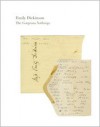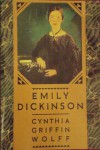Currently reading
Saints in Art
The Gorgeous Nothings: Emily Dickinson's Envelope Poems
Selected Poems
Emily Dickinson
Lies My Teacher Told Me : Everything Your American History Textbook Got Wrong
Gone with the Wind
Sense & Sensibility (Austen Project)
 Twice upon a time, there were three Dashwood sisters, though no one took much notice of the youngest one. Their father died far too young, and they and their mother were forced by their cruel sister-in-law and weak half-brother to leave the home they'd grown up in.
Twice upon a time, there were three Dashwood sisters, though no one took much notice of the youngest one. Their father died far too young, and they and their mother were forced by their cruel sister-in-law and weak half-brother to leave the home they'd grown up in. _Sense & Sensibility_ -- the first one, that is -- is a novel many readers find hard to love. I hated it the first time through. Marianne drove me *insane.* All that screaming and selfishness! "I don't *care* what anyone thinks, I shall *die* without the man I love!" Okay, she didn't actually say that in so many words; but she sure as heck acted like it. And she very nearly made it come true.
Now that I've read it more times than I've bothered to count, it's one of my favorite books in the world. Which sounds like some kind of literary Stockholm Syndrome, but really it's just a matter of my finally developing the kind of muscles and perspective it took for me to enjoy Austen's genius.
I love S&S and I love Joanna Trollope's novels, so of course I grabbed this when I saw it sitting alone and unloved on the library shelf. I am one of those Austen admirers who does *not* want to read the eleventy-millionth "sequel" to _Pride & Prejudice_, but I had faith in Trollope's powers. I wanted to see what she'd do with the story.
She'd transplant it directly to 21st-century England, is what she'd do. She'd keep all the names and major plot events exactly the same, on the theory that a story worth telling once is worth hearing twice.
Part of me was eaten up by envy. It never occurred to me that we were allowed to do that -- to take a book we admire and just write it again. Immediately, I started casting around in my mind for stories *I* could own like that.
I kept reading the whole time I was thinking along these lines, and I soon saw just how much subtle genius it takes to get away with a stunt like that. Yes, all the people and places go by the same names as they did in Austen's novel. But the Dashwood family in S&S1 is four women living on an inherited income. True, they're living on the cheap, for a genteel family. But it's taken as a given that their supposedly meager funds will stretch to cover not merely food and rent, but several servants and a home big enough to house all of them and a visitor or two besides. How will a modern reader relate to this sort of "poverty"? What will a modern writer employ as a sympathetic equivalent?
And what about the really melodramatic plot points that Austen barely got away with in the early nineteenth-century: the dueling, the forced marriages and secret engagements and natural daughters. How on earth are *those* going to be carried to our times?
Half the fun in reading this book is seeing how Trollope handles these tricky patches; the other half is the soothing delight of a story well told.
Romance is certainly important in this novel. (It *better* be, considering who its readers are sure to be.) But the modern Dashwood sisters must of course have something more going on in their lives than the hopes of a marriage both affectionate and reasonably wealthy.
Trollope paints the story anew with grace, wit, and obvious enjoyment. She doesn't do the usual cringe-inducing nonsense of trying to write like Austen (though she does sneak in a few lines from the original text, so smoothly that you won't notice unless you're a severe S&S nerd). She does make a few references to how things have changed since Austen's time:
"Honestly, Abi, it's all you ever think about. You're like those nineteenth-century novels where marriage is the only career option for a middle-class girl."
But mostly Trollope relies on her own clear, unmuddled prose to tell the story. Long-suffering Elinor is the sister who has to organize, plan, settle, smooth over, and smile when she feels like screaming -- "the price of having your head screwed on the right way," as Mrs. Jennings revisited observes sympathetically. And Elinor's affection for Marianne is made clear early on, in spite of the sisters having so little in common. Elinor actually feels sorry for her tempestuous, overly romantic younger sis:
"It must be awful, she often thought, to take everything to heart so, as Marianne did; to react to every single thing that happened as if you were obliged to respond on behalf of the whole feeling world."
That's some lovely character sketching. But it takes more than that to create a story worth reading. How is a contemporary reteller going to keep her audience engaged in a story we already know? How can she bring enough surprises to be interesting without leaving the original tale in tatters? She'll bore her readers if she changes too little, and enrage them if she interferes too much.
If you've read S&S, read this so you can see for yourself how clever Trollope is. If you haven't, read this and then go read Austen's novel. Either way, let's all be happy that when Trollope decided to try her hand at Austen, she wisely steered clear of P&P.
Now, if only someone would tackle _Northanger Abbey_...








